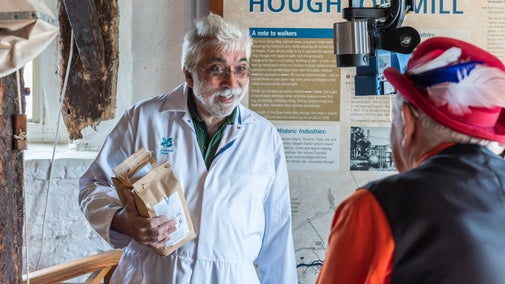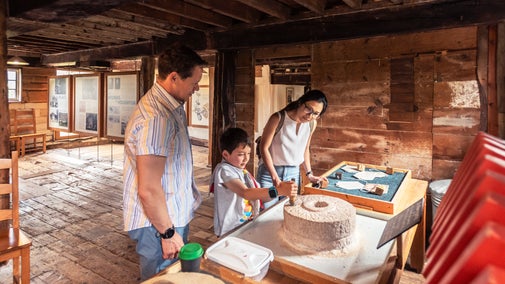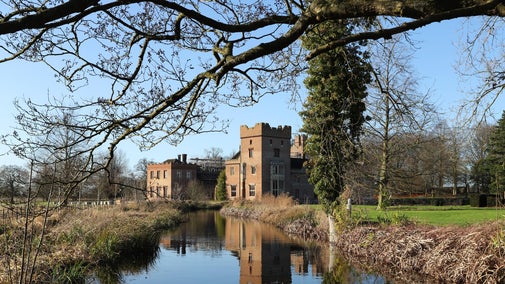
Donate
Everyone needs nature, now more than ever. Donate today and you could help people and nature to thrive at the places we care for.

Find out about the work we do throughout the year to keep Houghton Mill running smoothly. It's the last surviving mill on the River Great Ouse able to produce stoneground flour from a water-powered wheel. We want to make sure we preserve it for visitors to enjoy now and well into the future.
The impressive waterwheel you can see today at Houghton Mill is one of the largest in the UK. But when the mill was closed in 1928 the waterwheel was removed.
In 1983 The National Trust opened Houghton Mill to the public and, following repairs, the mill was able to start making flour once again. However, although the flour was milled using the original millstones, they were powered by an electric motor as the waterwheel had not been restored.
Finally, after over 70 years and with the help of a grant from the National Lottery Heritage Fund, we were able to reinstate a working waterwheel in 1999.
These days the river flow is controlled by the Environment Agency. In 2013 we installed a new set of electric-powered millstones. This means that visitors can still experience the sights and sounds of the mill in action, even if the conditions aren’t right for the traditional waterwheel to operate.
Every 10 years or so we need to carry out essential maintenance on the waterwheel to make sure it will continue to operate smoothly.
During the winter of 2019/2020 professional wheelwrights took apart and rebuilt the sluice gate. Over the summer of 2020 the volunteer team at Houghton Mill replaced 30 oak floats and 30 sole boards.

When Houghton Mill is open for the season, it can produce up to 150kg of flour on each milling day.
The mill uses French burr stones and the same traditional methods used over 150 years ago. Milling flour using 18th-century machinery is a noisy and very physical process that can eventually take its toll even on even the most hard-wearing of millstones.
Each year specialist millwrights Dorothea Restorations and our experienced volunteer millers work together to inspect, clean and prepare both pairs of millstones for the year ahead. Here’s how it’s done:
Before the millstones can be inspected, our millers carefully take apart the wooden casing. This is what protects the millstones (and our visitors) when they are in action. A stone crane is used to raise the top running stone.
The millwrights inspect the inner surfaces of the millstones to check for any uneven wear, glaze or moisture damage. They also measure how deep the furrows are.
The high-quality burr stones used at Houghton Mill should only need to be replaced every 100 years. However, every few years they will need to be redressed to make sure they work efficiently.
The neck bearing is taken apart, any grain is cleaned away and it’s then greased.
The millstones are put back together and the ‘furniture’ (tun, quant, horse and shoe) is put back around the millstones before a test run of the waterwheel.
When the millwrights and millers are happy everything is working, we’re ready to start producing freshly milled Houghton Mill stoneground flour again.
With your ongoing support, we're able to continue our vital conservation work. Thank you for helping to protect these special places.

Everyone needs nature, now more than ever. Donate today and you could help people and nature to thrive at the places we care for.
From tour guiding to keeping the picturesque campsite in top shape, find out about the volunteer roles available at Houghton Mill and Waterclose Meadows, how to apply and more. To find out more about volunteering at Houghton Mill, contact houghtonmill@nationaltrust.org.uk or call 01480 301494. Alternatively, you can search for ‘Houghton Mill’ on the National Trust volunteering website below to find opportunities and to apply.

Houghton Mill was a regional powerhouse at the height of the Victorian era, producing flour on an industrial scale. It later welcomed artists and the YHA, as an unusual place to stay.

From paddling a canoe down the river to a scenic bike ride, there's lots for families to do at Houghton Mill.

We believe that nature, beauty and history are for everyone. That’s why we’re supporting wildlife, protecting historic sites and more. Find out about our work.

Read about our strategy, which focuses on restoring nature, ending unequal access and inspiring more people.
